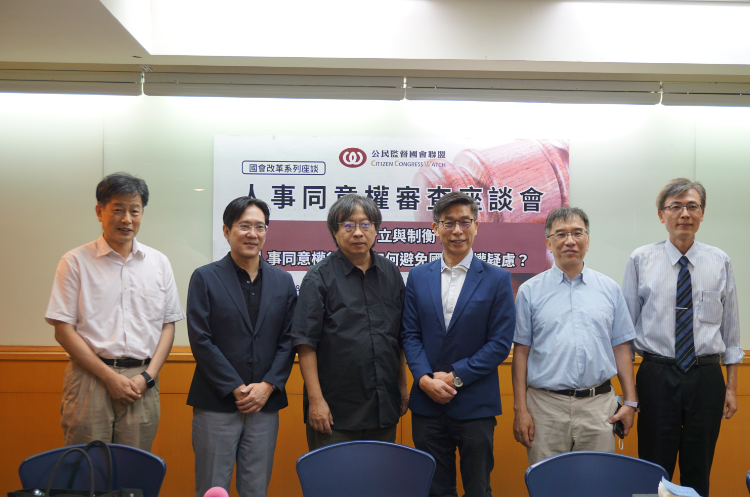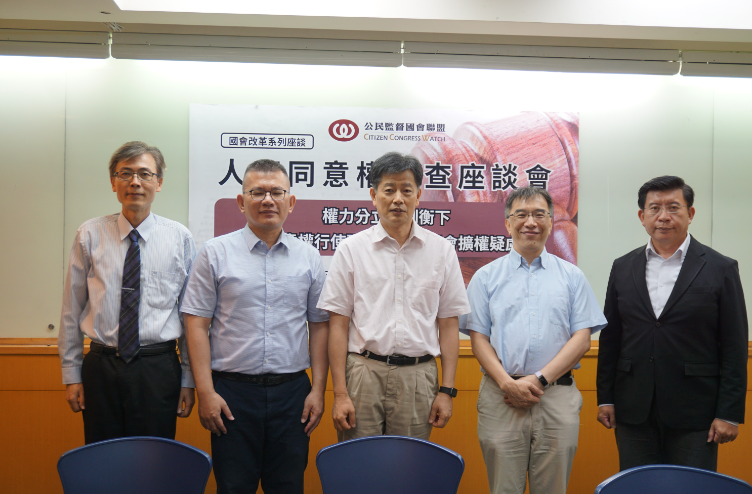How to avoid concerns that the Legislative Yuan will expand their powers through the right of consent to personnel under the framework of Separation of Powers and Checks and Balances? Symposium
發布日期 2024.08.13

The controversy around the Law Governing the Legislative Yuan’s Power continues to grow. Yesterday on August 6, the Constitutional Court examined six major controversial topics regarding to (State of the Presidential Report, counter-questioning, right of consent to personnel, power of investigation, power of hearings, and crime of contempt of the Legislative Yuan), allowing both sides to present their cases in an 8-hour-long debate. The presiding Judge Hsu Tzong-li announced that the verdict would be pronounced in three months and could be legally extended to up to 2 months.
Citizen Congress Watch’s Chairman Tseng Chien-Yuan (曾建元) states: “Citizen Congress Watch joined the Judicial Reform Foundation to testify that separation of powers is the core of this legal dispute. In previous instances of exercising the right to approve personnel, instead of allowing independent institutions to operate impartially, Taiwan’s Legislative Yuan would often become a battlefield between political parties. However, whether legislative or executive power wishes to interfere in it, it will cause the Legislative Yuan’s investigation to have two conflicting standards. If it’s not an oversight, it’s a boycott, and it will strongly harm all Taiwanese people’s rights and interests. Citizen Congress Watch implores that the Legislative Yuan consider how to create a favorable system or convention, while simultaneously avoiding conflict from once again happening when investigating the Personal Rights Act.”
Citizen Congress Watch’s Managing Director Wu Kun-Lu (吳鯤魯) states: “Yesterday thousands upon thousands of people simultaneously watched broadcasts of the proceedings. It’s obvious the people’s opinion on the Legislative Authority Amendment is that it is an unlawful expansion of power! If we want to look at this positively, this is a precious opportunity for citizens’ civil education, but we at Citizen Congress Watch think that these discussions should be conducted within the legislative process, rather than letting the Supreme Court clean up the mess. This should not become normal in a democratic country. Citizen Congress Watch implores legislators to not corrupt the original intentions of these processes, but rather to diligently work hard in the process to conduct essential discussions!”
Personnel investigation reduced to political performance - how do we return professionalism to the forefront?
In addition to the powers of inquiry, law, and budget proposals that are known to the general public, the Legislative Yuan also has the extremely important power of appointing staff. In particular, the Legislative Yuan will oversee three big staffing cases in the latter half of the year (National Communications Council Committee, Examination Committee, and the Grand Justice). If there was no rigorous review, or it was not approved on time, it would negatively impact the operation of the constitutional government!
Incumbent DPP lawmaker Chung Chia-Pin (鍾佳濱), who previously served as a National Assembly representative and participated in the constitutional amendment process, shares a practical perspective on this: “In the context of the history of constitutional reform, and when looking at the powers and responsibility that fall under the right to approve staff, the original Control Yuan and National Assembly’s jurisdiction were moved to the Legislative Yuan, which let the Legislative Yuan gradually become the core of Taiwan’s government! However, the right to consent to personnel is not that important to the Legislative Yuan, particularly for opposition members, because they have no opportunities for public exposure. As a result, it causes personnel approval investigations to become a type of governmental boycott or obstruction, instead of conducting discussions about staffing in a suitable manner!”
Chung Chia-Pin (鍾佳濱) states: “This case of legislative power expansion has not been thought through regarding separation of powers or how to avoid infringing on other people’s or organization’s rights. It will turn nominees into witnesses, it will allow the premier to turn into a judge, and it will get to the point where it will paralyze administrative organs. This is obviously unreasonable! I hope that the government and the people will reach a consensus that is faithful to the constitution and will let the country run peacefully!”
Legislative Yuan member and Zhongshan University Politics and Economics Professor Jang Chyi-Lu (張其祿) states: “From a macroscopic framework, although Taiwan’s form of government is close to the French Fifth Republic’s dual-executive system, Taiwan’s political parties are all strong political parties. Therefore, there is no way to implement the spirit of left-right co-governance, as the constitutional system’s structure would be imbalanced, which would make the Legislative Yuan into a political stage rather than an area for substantive political operations. I believe that the government, the people, and all political parties should start from a large-scale societal consensus and reform from that. Using that as a precedent would allow diverse democratic voices to enter the discussion, as well as prioritize the well-being of the people. It should not be used to maliciously paralyze administrative bodies.”
Professor Jang Chyi-Lu (張其祿) says: “When previous political parties had full control of the government, independent institutions would be questioned by society. The politicization of independent institutions was certainly a severe issue! Professional entities’ political nature should not be prioritized over their professionalism, and the Legislative Yuan should think of how to make corrections to the system before and after the reforms, abandon political tit-for-tats, and make compromises. I urge that the independent investigation returns to professionalism and uses transparency and self-discipline to let the people believe that they are not serving the ruling party.”

Rigorous reviews are the consensus among all people; experts and scholars call for the right of consent to personnel not to be seen as a tool for political wrestling!
Su Tzu-chiao (蘇子喬), a professor at the Department of Political Science at Soochow University, believes that “There should be a major premise before discussing the Legislative Yuan’s right of consent to personnel. Namely, in a democratic country, political parties can be rotated. The country's overall constitutional situation should be considered before amending the law rather than using the right of consent to personnel as a weapon for political wrestling. That is inappropriate! At the same time, in the process of tightening the rigorous review, care should also be taken to avoid violating the principle of separation of powers.”
Professor Su Tzu-chiao (蘇子喬) continues to point out the issues of the amendment of the right of consent to personnel. He believes that “The loyalty obligations of constitutional institutions are integrated. The president has the right to nominate but cannot refuse to nominate; the Legislative Yuan has the right to approve personnel, but it cannot refuse to exercise this right. Under this premise, the amendment mentions that if the nominee does not provide an affidavit, the Legislative Yuan shall not review it. This indicates that the Legislative Yuan has passively exercised its right of approval, which may be a highly controversial provision. Additionally, raising the threshold of exercising the right of consent to personnel to two-thirds, to accumulate a greater consensus between the government and the opposition, is also one of the solutions that can be discussed.”
Chen Hung Ming (陳宏銘), a professor at the General Education Center of Chung Yuan Christian University indicated, “Currently the review of our country’s right of consent to personnel has fallen into two extremes. In the case of a unanimous government, the review of personnel is more lax. In the case of a split government, personnel review is subjected to a political boycott. He believes that sound legislative power should be given to a well-thought-out and more solid review power of the Congress so that Congress can supervise the executive power. This is also what Citizen Congress Watch used to advocate for in the past, seeking a more reliable method at the same time of system reform. Only when all political parties first reach a consensus can the doubts about power expansion or unconstitutionality be avoided.
Before pointing fingers make sure your hands are clean, legislators should hold themselves to the same standard!
Chen Li-Fu (陳俐甫), President of the Taiwan Professors Association, believes that “Current controversy in the Congress, or perhaps the continuing review of the case of the Congress’s right of consent to personnel, at the core involves the congenital defect of the constitution. He thinks that the Constitution of the Republic of China is like clothes that you change as you wear; the body grows up but is unaware of it. Over the past decade, people’s citizen consciousness has risen, but our constitutional structure has not progressed with time. The subsequent impacts include the inability to clarify the many political reforms of the review mechanism of the right of consent to personnel. Once again, we call on the members of the legislature to not pursue selfish interests, to attract the media’s attention through struggle types of amendments, and end up ruining the function of the country!”
Professor Chen Li-Fu (陳俐甫) also questioned: “KMT and TPP both proposed amendments requiring nominees to provide personal information without false statements. However, legislators falsely claimed their academic qualifications and experience in election communiqués without penalty. Is this not a type of double standard? The Legislative Yuan should uphold itself to the same standard in order to have the right to demand others.”
Chang Hung-Lin (張宏林), Director of the Citizen Congress Watch reiterated the value position of his organization, “In this congressional reform, there are many reform directions which are the reform matters that the Citizen Congress Watch has long called for in the past. These include tightening rigorous review on the right of consent to personnel and establishing congressional investigative powers to assist legislators in exercising their power. However, this time, we see that Congress reform is a good thing and theoretically should be supported by all citizens. The opposition party has carried it out in the wrong way though, resulting in the Congress's powers and amendment entering the stage of constitutional interpretation.
As for tightening rigorous review on the right of consent to personnel, Citizen Congress Watch’s stance will not change, but we advocate that the exercise of the right of consent to personnel should be more thoughtful. For example, If parties support a nominee visiting the Legislative Yuan, wouldn’t there be additional issues related to avoidance of interest? or perhaps increase the density of the personnel review case, these questions should be discussed thoroughly within the Legislative Yuan!”
Lastly, Director Chang Hung-Lin (張宏林) states: “We vehemently condemn malicious challenges to the chief justice that lead to societal division and government crises. In democratic countries, the chief justice is the last line of defense for constitutional order, so the government and people should accept the verdict. Additionally, the biggest blindspot of political reform is that it only serves to expand power without accountability. The Legislative Yuan has yet to establish a mechanism for accountability and consequences that is convincing to the public, so much so that despite Fu Kun-Chi’s criminal verdict, he could still write inquiry documents and keep his qualification as a legislator. This is the main reason why citizens have no trust in the Legislative Yuan!”
Symposium attachments
First half live link:
https://www.facebook.com/share/v/bdVQAS2ami4XUKdN/?mibextid=oFDknk
Second half live link:
https://www.facebook.com/share/v/cKWNokbec6w9PTgZ/?mibextid=oFDknk
Photo link:
https://drive.google.com/drive/folders/1OKnnd8l1F2Ppqemct9g9qoe-hyA1TeAD?usp=sharing